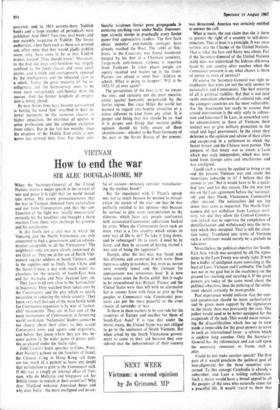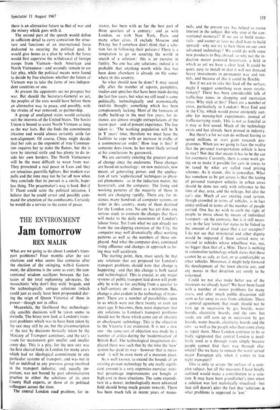How to end the war
VIETNAM SIR ALEC DOUGLAS-HOME, MP
When the Secretary-General of the .United Nations makes a major speech in the context of war and peace it is right that the world should take notice. His recent pronouncements that the war in Vietnam stemmed from nationalism and not from Communism and that the con- tinuation of the fight was 'totally unnecessary' certainly bit the headlines and brought a sharp reaction from those who challenge his premise and his conclusions.
Is this battle just a civil war in which the Vietcong and the North Vietnamese are only concerned to find a government and an admini- stration acceptable to all the Vietnamese? The neighbours who are most closely concerned do not think so. They see in the use of North Viet- namese regular soldiers in South Vietnam, and In the supplies sent so freely from China and the Soviet Union, a war with much wider im- plications for the security of South-East Asia and for Australia and New Zealand later on.
They have lived very close to the 'nationalists' in Indonesia. They watched them taken over by the Communists and the plot which so nearly succeeded in subduing the whole country. They know very well that one of the most fertile fields for Communist expansion is by way of 'nation- alist' movements. They are in fact one of the main instruments of Communism in fomenting world revolution. 'Nationalist' leaders cannot be too choosy about their allies; so they accept Communist arms and agents and organisers, and before they know where they are they be- come pawns in the wider game of power poli- tics as played under the Stalin rules.
Fidel Castro's latest speeches in Cuba; Presi- dent Nasser's actions on the frontiers of Israel; the Chinese rising in Hong Kong—all three are too much of a pattern to leave any doubt that nationalism is grist to the Communist Mill. If this war is simply an internal affair of Viet- nam, why do Malaysia and Singapore ask for British troops to remain in their countries? Why does Thailand welcome American bases and why does India—the most unaligned and peace- ful of nations—seriously consider manufactur- ing the nuclear bomb?
But the impatience with U Thant's speech was not so much because be seemed to miscal- culate the nature of the war—on that he was perfectly entitled to his opinion—but because he seemed to give scant consideration to the dilemma which faces any people confronted with nationahst-Communist subversion backed by arms. When the Communists force such an issue, what is a free country which values its own way of life to do? To take it lying down, and be submerged? Or to resist, if need be by force, and then be accused of having started a war and of being the aggressor?
Europe, after the last war, was faced with this dilemma and answered it with NATO. Here there was safety in numbers; but, even so, nerves were severely tested and the clamour for appeasement was sometimes loud. It is now some years since the Berlin airlift. But it ought to be remembered that Britain, France and the United States were then left with no alternative but to answer force with force or give up free peoples to Communist rule. Communist pres- sures can put the most peaceful to the cruel choice of surrender or War.
Is there in these matters to be one rule for the countries of Europe and another for those of South-East Asia? It is true that under the SEATO treaty, the United States was not obliged to go to the assistance of South Vietnam. But when asked by the South Vietnamese govern- ment to come to their aid because they con- sidered that the independence of their country
was threatened, America was certainly entitled to answer the call.
What is more, she can claim that she is there to protect the right of a country to self-deter- mination. That at least is a principle. It was once written into the Charter of the United Nations. That is what the fuss and flurry was about. For if the Secretary-General of the United Nations really does not understand the hideous dilemma faced by one country after another when the Communist pressure is on, what chance is there of justice or even of survival?
Of course the Secretary-General was right to emphasise that arms are not the only answer to nationalists and Communists. The best security of all is political stability. But that is not easy in the immediate aftermath of colonial rule, and the youngest countries are the most vulnerable. Are the Americans too ready to assume that armed intervention is the only reply to subver- sion and take-over? In Laos, in somewhat simi- lar circumstances to those of Vietnam, their instinct was to give military protection to the royal and legal government. In the event they deferred to the opinion and advice of their allies and cooperated in a settlement to which the Soviet Union and the Chinese were parties. The purpose of that treaty was to create a Laos which was truly independent, which was insu- lated from foreign arms and interference and was unaligned.
Could such a treaty be applied to bring to an end the present Vietnam war and could the Americans subscribe to it? I believe that the answer is 'yes.' But it would have to be a quali- fied 'yes,' and for this reason. The ink was not dry on the Laos agreement before the 'national- ists' and their North Vietnamese Communist allies cheated. The nationalists did not lay down their arms as requested. The North Viet- namese did not withdraw from Laotian terri- tory, nor did they allow the Control Commis- sion (which was to supervise the completion of demilitarisation and withdrawal) into the terri- tory which they occupied. That is still the situa- tion today. Translated into terms of Vietnam such a settlement would merely be a prelude to take-over.
Nevertheless the political objective for South- East Asia which was accepted by all the signa- tories to the Laos Treaty was surely right. It was for a buffer of unaligned states consisting at the least of Laos, Vietnam and Cambodia. The fault was not in the goal but in the machinery on the ground for reaching and securing it. If the great powers are today of the same mind about the political objective, then the policing of the settle- ment should certainly be manageable.
Past experience would indicate that the con- trol commission should be more authoritative and be given more support by the signatories to the treaty than was previously the case. The police would need to be better equipped for the magnitude of the task. This would mean remov- ing the disqualification which has up to now made it impossible for the great powers to serve in such an international force—a reform which is anyhow long overdue. Only the Secretary- General has the information and can call upon the necessary resources to frame such a plan.
Could he not make another speech? The first part of it would proclaim the political goal of non-alignment for the three countries con- cerned. To this concept Cambodia is already a subscriber, and Laos a willing collaborator. Such a theme would have a broad appeal to all the peoples of the area who naturally crave for a peaceful life. It would reveal to them that
there is an alternative future to that of war and the misery which goes with it.
The second part of the speech would define in sufficient detail to carry conviction the struc- ture and functions of an international force dedicated to securing the political goal. It would give bones to a plan by which the force would first supervise the withdrawal of foreign troops from Vietnam—both American and North Vietnamese—and secondly remain to see fair play, while the political means were found to decide by free elections whether the future of Vietnam was to take the form of two indepen- dent countries or one.
At present the opponents see no prospect but war. But should the Secretary-General so act, the peoples of the area would have before them an alternative way to peace, and possibly, with the strains of war removed, to partnership.
A group of unaligned states would certainly suit the interests of the United States. The Soviet Union is bound to assist North Vietnam as long as the war lasts. But she finds the commitment irksome and would almost certainly settle for non-alignment. Of course, China might decide that her role as the exponent of true Commun- ism requires her to stoke the flames, but she is torn by internal strife and has plenty to do in- side her own borders. The North Vietnamese will be the most difficult to wean from war. They prevented a real peace in Laos and they are tenacious guerrilla fighters. But modern war palls and the time may not be far off now when they conclude that its pursuit is a sterile, hope- less thing. The peacemaker's way is hard. But if U Thant could seize the political initiative, I believe that he could arrest and possibly com- mand the attention of the combatants. Certainly he would do a service to the cause of peace.































 Previous page
Previous page